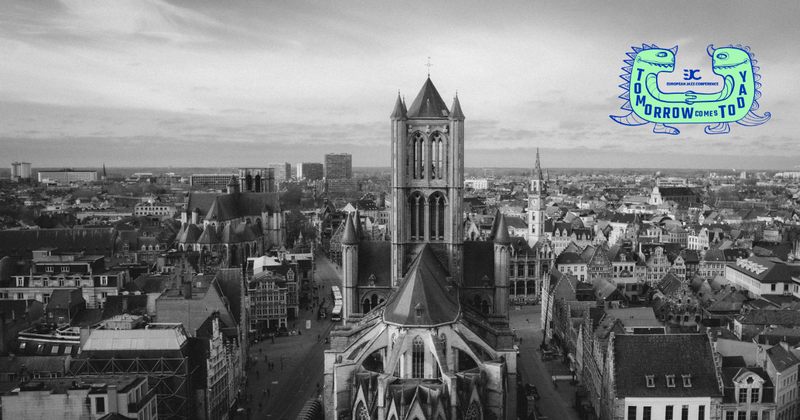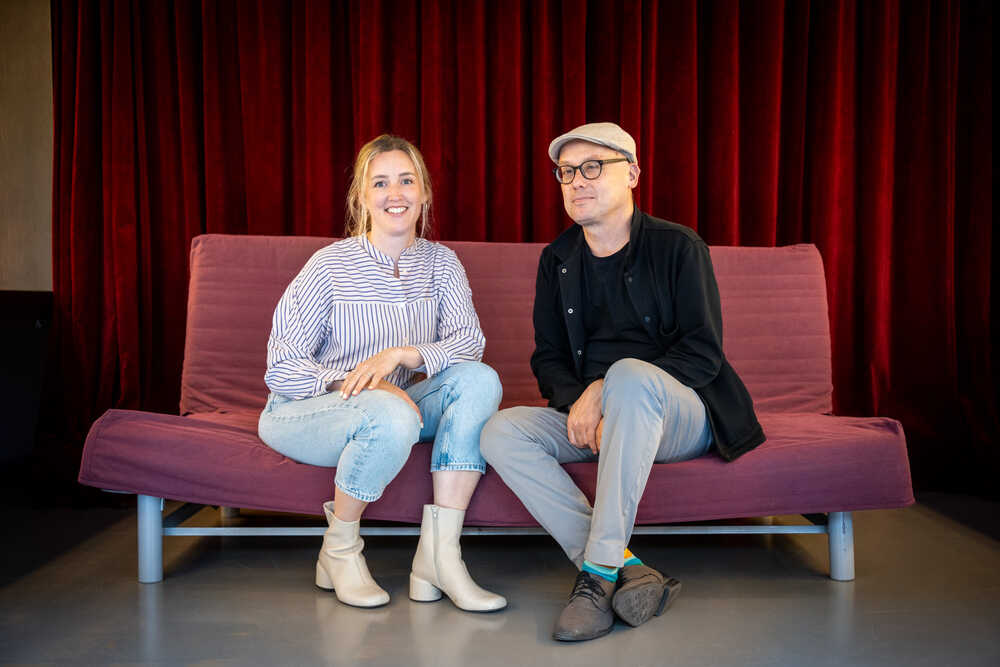An interview by Stijn Buyst
In October, after twelve years of programming at Ha Concerts, Wim Wabbes will take his well-deserved retirement. Big shoes to fill, but with Jaïr Tchong there is a successor ready to take up the challenge with great enthusiasm.
You programmed for the past four years in Bruges and Ostend, at Arts Center KAAP.
Jaïr Tchong: 'Before that I worked as a freelance cultural journalist for De Groene Amsterdammer, Het Parool, De Volkskrant and VPRO, among others. One day I got a call from the founder of the Tolhuistuin, a venue in Amsterdam, because he liked my pieces in De Groene Amsterdammer so much.
I quickly realized that it was more fun to organize things myself than to write reviews late into the night that would one day appear in the newspaper.'

'The Tolhuistuin started out as a social-artistic start-up, so we mainly brought different art forms to the then completely ungentrified Amsterdam-Noord. From this pioneering work at the Tolhuistuin I ended up at the Melkweg, where concerts had been organized for over forty years.
There I learned programming in a long, consistent line. But I always had a musical bent for what was happening in Belgium, so when I got the job offer at KAAP from a friend in Brussels, I decided to take the plunge.'
And now at Ha Concerts you succeed Wim Wabbes, who is retiring.
'Of course, taking over from Wim is an exciting undertaking, if only because of his international and local track record. Well, Wim has already programmed quite a bit, so the transition is going smoothly. The first concert I was able to arrange myself for Ghent is on October 14th, Amirtha Kidambi's Elder Ones.
This New York group combines Indian vocals with "groove-based" free jazz and features musicians from the circle of the late Jaimie Branch. Kidambi symbolizes an important development in improvisation and jazz: further hybridization and a return to social engagement.'
'At the same time, with Ha, we remain committed to Belgian jazz. The Belgian scene is healthy - with two big subsidized labels and many good acts and musicians.
Internationalization in two directions remains my main driving force, which I think is crucial for any healthy scene. We have to avoid 'playing around the church tower'.'
The first concert I was able to arrange myself for Ghent is on Oct. 14, Amirtha Kidambi's Elder Ones. This New York group combinesIndian singing with “groove-based” free jazz, featuring musicians from the entourage of the late jaimie Branch.
Jaïr Tchong

Amirtha Kidambi’s Elder Ones
'New Monuments'
Jazz with “spiritual punk”
20:15 TicketsI immediately think of the bassist Farida Amadou, who from the beginning grabbed every opportunity she saw, and has since been playing all over Europe with the big boys.

'That is indeed a good example. Farida, but also Joachim Badenhorst, Dorian Dumont, Esinam and Anke Verslype (from aki) are very active, also internationally.
I think that with Ha Concerts we can offer added value in terms of contacts with international musicians and development, as well as - purely practically - for the programmers.'
I think with Ha Concerts we can provide added value, in establishing contacts with both international musicians and development and - purely practically - the programmers.
Jaïr Tchong
'The Antwerp non-profit organization Sound in Motion also works in this way. What I really like about their work is the way they approach impro and indie jazz with a proud punk do-it-yourself ethic. Now that they are also working on a residency recording studio, they are already becoming an interesting partner for this very international dialog.'
From Bruges and Ostend to Ghent, that's also a change of artistic landscape?
'Sure, the cultural offer here is enormous, there are many players and the quality is high. This is a big difference to Amsterdam, where you are dealing with a monopolistic player with Paradiso, and where cooperation has often proved difficult.
In Ghent, the lines of communication are short. Yesterday I experienced the Ghent Arts Consultation for the first time and it felt very good.'
The cultural offer here in Ghent is enormous, there are many players and the quality is high.
Jaïr Tchong
What do you think is the strength of the Ha programming?

'What I really like is that it provides a stage for the most interesting connections between jazz and global, for lack of a better word, on the one hand, and pop/rock on the other. I continue to find the acoustics and ambience of the house impressive.
As a programmer, I have a preference for musicians who are not too religiously reverent of the jazz tradition. I mentioned Amirtha Kidambi: she combines Indian vocal techniques with free jazz out of a deeply felt social commitment.
This project was born in 2015 out of the outrage over the police killings of Eric Garner and Mike Brown. Musicians from the scene she comes from regularly perform at street protests.'
'Now, of course, Ha Concerts is not a political center; the arts remain a priority. But Kidambi's music resonates strongly in current contexts, like maybe Trump in power again. Her music makes the origins of jazz, linked to a deep social commitment, palpable again.'
The most beautiful concert I saw this year was the Palestine Benevolence that Joachim Badenhorst put on a few weeks in Antwerp, at Het Bos.
'I find it interesting to see how this commitment is alive and well in the improv scene. Under the banner of Eye on Palestine, we are now working with a number of partners in Ghent to see if we can organize a similar benefit this fall.'
What could be different?
'Many European venues and jazz festivals operate on a well-functioning circuit. The fact that the European Jazz Conference will take place in Ghent in September is a nice and fitting statement by Wim, who made it happen.
But there is also a whole world out there to discover: bands from other parts of the world that often lack financial access or fall off the radar tout court.'

#Story
European Jazz Conference 2024 ✨ Public program
A conversation with South African jazz pianist Nduduzo Makhathini gave me a lot of food for thought. He did his doctorate in South Africa on the need for a new paradigm: "African jazz.
From the continent itself and no longer as an afterthought to the American example. Makhathini has been given the opportunity by Blue Note to search all over Africa for new young musicians who use the North American jazz language but do something completely unique with it.'
'I certainly want to explore the possibility of presenting this kind of jazz, which also has global connections, at Ha Concerts.
There is an American booker who has set up a network in Africa to take the infrastructure for live music there to a higher level - in connection with the possibilities here in the "West". This international "conversation" is, I think, crucial to any desired development of jazz.'
I certainly want to explore the possibility of presenting such jazz, such as African Jazz, which also has connections to “global,” at Ha Concerts
Jaïr Tchong
You share programming duties with a number of colleagues?

'Yes, Eric Smout (Democrazy) is doing some of the pop/rock/singer-songwriter programming and Evelien De Jaeger is working ad interim on the youth operation. We are working to rejuvenate the potential audience for jazz, and you can't start early enough.
The late jaimie branch is an example of what is possible. She had a very expressive, wild style, but always in a genial, deeply felt dosage with lyrical pieces. And even with her, commitment was never far away. Every time we programmed her at KAAP, you could immediately see that a much more diverse audience was drawn to her.'
I wouldn't take my parents to any free jazz concert, but regret never taking them to jaimie.
Exactly, and the way their label - International Anthem - heals, I think, is also an example to follow. International Anthem thinks primarily in terms of the musicians involved - almost like a family, within which new related groups and projects are constantly emerging.
At the same time, they do not have any unnecessary reverence for the jazz canon, but are always looking for new forms and contemporary expressions.
Finally, if you had to sum up your music taste in one record, which one would it be?
'Ha, I recently moved, and before I did, I went through my entire music collection. I saw some recurring themes. I find hybridization and the history of Afro-Latin jazz very interesting: how jazz traditions are handled in Cuba, Congo, Senegal, Mali, South Africa and Ethiopia, for example.
An album that never bores me is "The Sign And The Seal" by Steve Coleman & Afrocuba De Matanzas. An incredibly rich album that I associate with Captain Beefhearts' "Trout Mask Replica". I can listen to both of them again and again without ever getting bored.
Sometimes it sounds like two ensembles in the same room doing something completely different at the same time, interspersed with passages of magical synergy. Later, Coleman did interesting things with Indian rhythms, vocals, and strings...'
'But I could have chosen from all these Belgian musicians who touch me deeply: Joachim Badenhorst, Aki, Lara Rosseel, Pak Yan Lau, Giovanni di Domenico, Alex Koo, Liesa Van der Aa, Mattias De Craene, Don Kapot, Bert Cools and his Granvat stable, Bandler Ching, Grid Ravage, Donder - too many to mention.'

